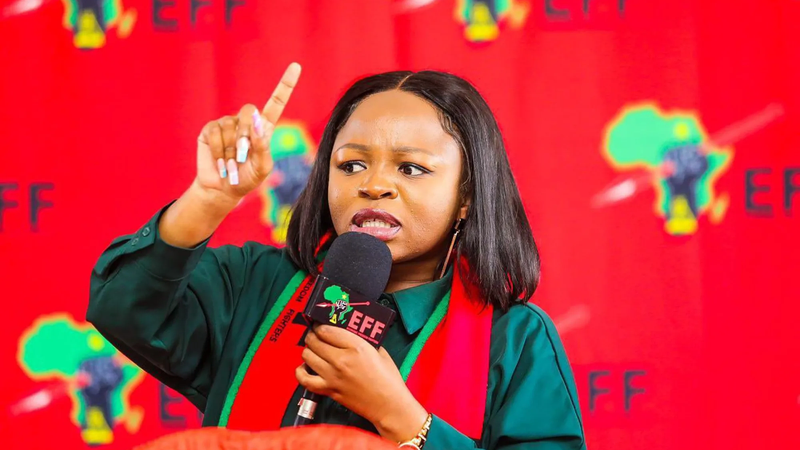Naledi Chirwa, a member of parliament from the Economic Freedom Fighters (EFF), delivered a scathing response to President Cyril Ramaphosa’s recent State of the Nation Address (SONA), accusing him of being bullied and failing to address the country’s most pressing issues. Chirwa, known for her vocal criticism of the government, delivered a passionate speech on behalf of marginalised groups, condemning Ramaphosa’s leadership and his inability to bring about meaningful change for South Africans.
Chirwa did not mince her words when she claimed that the president had been “bullied” by powerful internal and external forces, notably Western imperialist groups. She expressed frustration over Ramaphosa’s lack of support for the expropriation of land without compensation, a central issue for the EFF and a key pillar of their political agenda. Chirwa argued that the president’s failure to push for this policy was indicative of his submission to external pressures, leaving millions of South Africans disenfranchised and excluded from economic opportunities.

In her critique, Chirwa pointed to Ramaphosa’s reluctance to support key legislation, such as the amendment of Section 25 of the Constitution, which would pave the way for land reform. She also expressed disappointment over his inability to implement policies that could help uplift small-scale farmers and food producers by ensuring government purchases benefit local producers. Chirwa suggested that such policies could stimulate economic activity and create sustainable job opportunities, particularly in the agricultural sector.
Chirwa’s speech also highlighted the widespread challenges facing South Africans, particularly the youth. She addressed the grim reality for many young graduates who, despite achieving academic success, face an uphill battle in finding employment. The lack of job prospects for young South Africans, coupled with the difficulties of accessing basic services, has left many feeling hopeless. Chirwa spoke on behalf of women, particularly black women, who continue to experience systemic injustice in various aspects of life, including the legal system. She also brought attention to the plight of disabled children, such as 17-year-old Amahle, who has not received the education she deserves, and Khanyisile, a young black girl facing racial bullying in school.
Chirwa further criticised the government’s failure to address ongoing social and economic issues, such as the exploitation of workers, paltry wages for farm workers, and the rampant violence affecting communities across the country. She condemned Ramaphosa’s administration for not delivering justice or providing protection for the most vulnerable members of society.
Central to Chirwa’s criticism was the EFF’s call for the nationalisation of key industries, including mines, banks, and other sectors that could contribute to economic freedom for all South Africans. She argued that the government had failed to create an environment conducive to economic prosperity, which is necessary to redress the injustices of the past. The nationalisation of industries, according to Chirwa, would be an important step in ensuring that South Africa’s resources benefit the people, rather than a few wealthy elites.
Despite the harsh tone of her speech, Chirwa concluded on a note of hope, reiterating the EFF’s radical vision for South Africa’s future. She emphasised the need for economic freedom and a transformative approach to governance, one that ensures equal access to quality education, healthcare, housing, and sanitation for all South Africans. The EFF’s commitment to expropriation of land without compensation, the nationalisation of key industries, and the abolition of tenders in favour of state capacity remains a core tenet of the party’s platform.
In the face of adversity, Chirwa and the EFF remain resolute in their push for a fairer, more equitable South Africa, where the country’s wealth is used to benefit the many, rather than the few. Their call for “economic freedom in our lifetime” continues to resonate with those who feel excluded from the opportunities and resources that should be available to all citizens.
